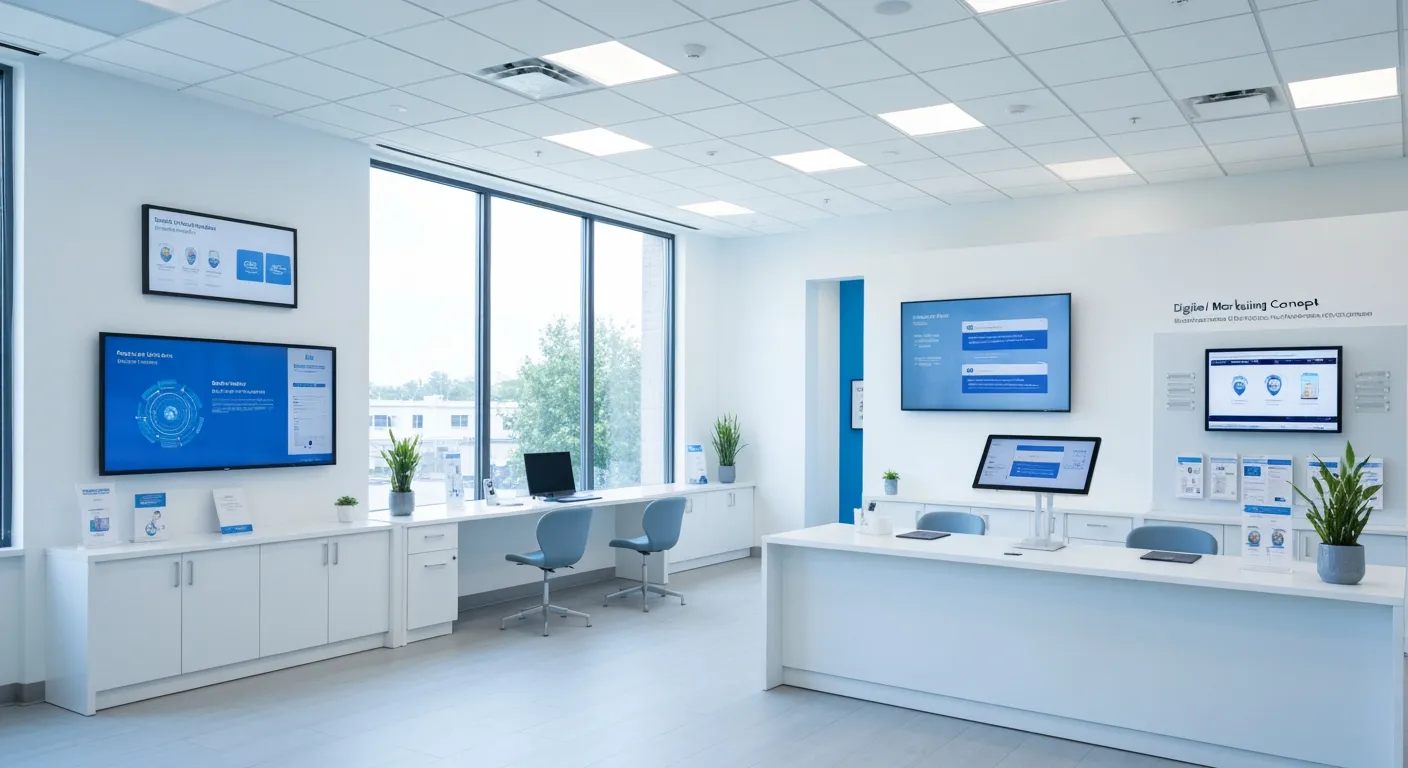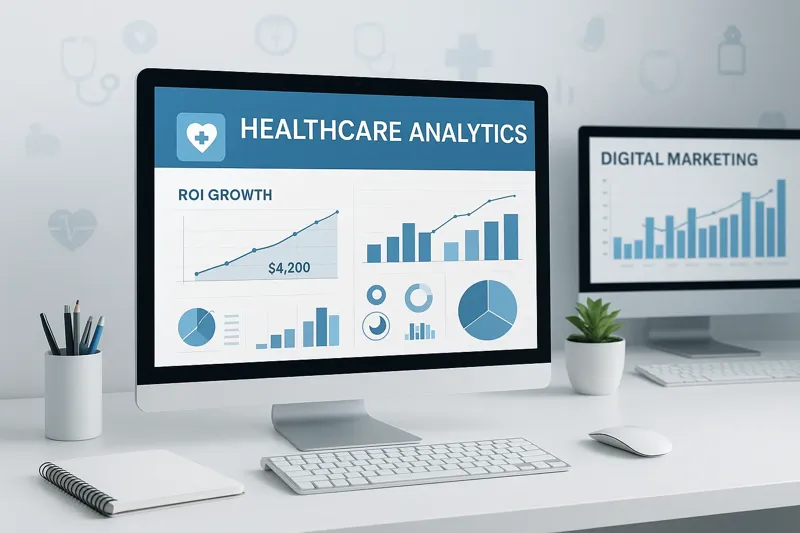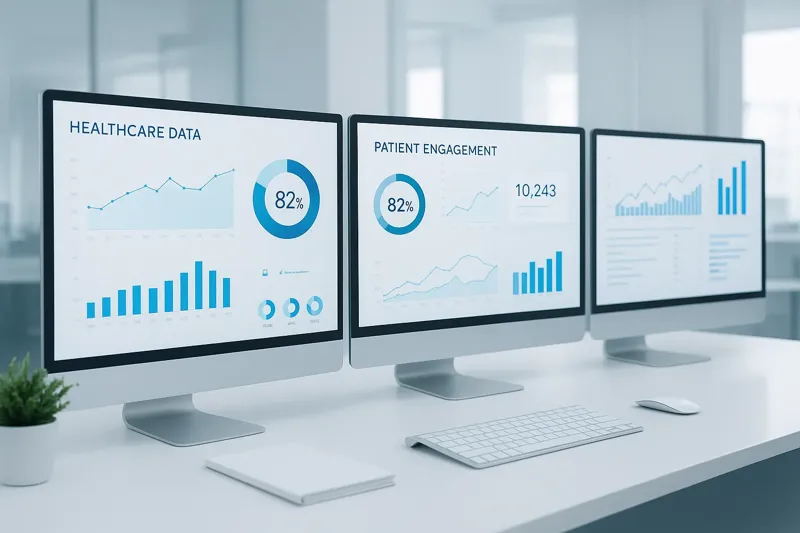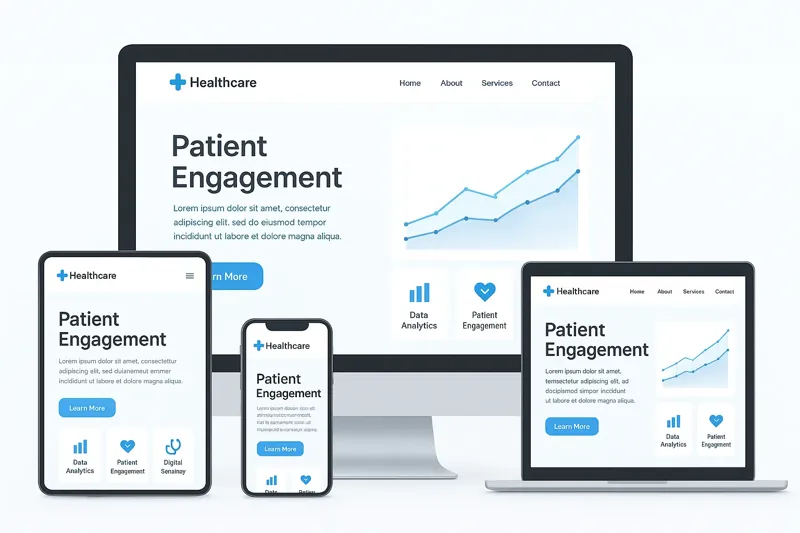The Rise of Healthcare Digital Marketing
Importance of Digital Marketing in Healthcare
Digital marketing has become indispensable for healthcare providers aiming to enhance their visibility, attract new patients, and maintain competitive advantage. With an increasing number of patients turning to online sources to research medical conditions and healthcare providers, a strong and well-executed digital presence is essential. Effective strategies, including SEO, content marketing, social media, and email campaigns, enable healthcare organizations to educate patients, build trust, and streamline the care pathway.
Patient Online Research Behaviors
Studies show that approximately 77% of patients conduct online research before booking appointments, and about 80% of internet users search for health-related topics. This behavior underscores the critical role of accessible, accurate, and trustworthy digital content in influencing patient decisions. Moreover, search engines drive significantly more traffic to hospital websites than other sources, and consumers increasingly rely on reviews and social media engagement when choosing providers.
Impact of Digital Transformation on Healthcare Marketing
The COVID-19 pandemic accelerated the digital transformation in healthcare marketing, with telehealth and virtual engagement becoming central to patient experience. Organizations have adopted advanced tools such as AI-driven analytics, personalized marketing platforms, and omnichannel strategies to meet patient expectations for convenience and tailored communications. Compliance with privacy regulations (like HIPAA) alongside innovative digital solutions allows healthcare marketers to optimize outreach efforts while maintaining trust and legal integrity.
Search Engine Optimization: The Cornerstone of Online Visibility

Effective SEO strategies for healthcare
SEO is foundational for healthcare providers aiming to improve online visibility and attract high-value patients. Successful strategies involve optimizing the website's technical aspects, ensuring content quality, and adhering to search engine algorithms. This multifaceted approach drives organic traffic, enhances patient acquisition, and builds trust.
Website optimization essentials
A healthcare website should provide a fast-loading, secure, and user-friendly experience. Clear navigation, structured data implementation, and optimized metadata (titles and descriptions) improve search rankings. Mobile optimization is critical as over half of health-related searches occur on mobile devices, ensuring accessibility and responsiveness across all platforms.
Strategic keyword usage
Keyword research must focus on terms relevant to patient needs, including specific services, symptoms, and local queries. Incorporating natural language keywords, especially for emerging voice search trends, improves discoverability. Keyword placement in titles, headings, and content should maintain readability and relevance.
Local SEO's role
Healthcare providers benefit significantly from local SEO tactics such as managing Google Business Profiles, accurate contact information, patient reviews, and localized content. Using geo-specific keywords in website content and metadata drives higher visibility in location-based searches, connecting providers to nearby patients.
Compliance with Google's E-A-T guidelines
Adhering to Expertise, Authoritativeness, and Trustworthiness (E-A-T) principles is essential in healthcare SEO. Publishing doctor-reviewed, evidence-based, and accurate content reinforces credibility. Displaying certifications, accreditations, and patient testimonials further strengthens trust and ranking potential.
Continuous mobile optimization
Given the predominant use of smartphones for health searches, maintaining a responsive design and mobile-friendly interface is non-negotiable. Mobile optimization increases engagement, lowers bounce rates, and ensures compliance with search engine requirements for ranking.
By integrating these SEO best practices, healthcare providers can enhance their digital footprint, build patient trust, and achieve measurable growth in patient acquisition.
Content Marketing: Building Trust and Authority through Valuable Information

Importance of High-Quality Content
High-quality content is foundational in healthcare digital marketing, playing a critical role in establishing trust and authority. Educational and informative materials not only engage patients but also demonstrate a healthcare provider's expertise and commitment to patient well-being.
Blogs and Articles
Blogs and articles remain effective tools for delivering valuable health information. Regularly updated, well-researched posts help attract organic traffic and improve search engine rankings. They serve as platforms to address patient concerns, explain medical conditions, and highlight available services, reinforcing the provider’s role as a trusted health resource.
Patient Education
Educating patients through content empowers them to make informed healthcare decisions. Clear explanations of procedures, treatment options, and preventive care increase patient confidence and adherence. Educational campaigns integrated into content marketing in healthcare nurture patient relationships and encourage ongoing engagement.
Multimedia Content Including Videos
Incorporating multimedia such as videos significantly enhances engagement. Educational videos, virtual tours, and doctor interviews make complex medical information more accessible and relatable. Videos can increase conversion rates by up to 80%, providing a powerful way to communicate trust and credibility.
Patient Testimonials and Social Proof
Patient testimonials add an authentic voice to content marketing, strengthening credibility and influencing prospective patients’ decisions. Displaying real experiences and reviews builds social proof, which is highly persuasive in motivating new patient inquiries and appointments, as noted in healthcare social media marketing strategies.
Social Media Marketing: Engaging Communities and Enhancing Brand Awareness
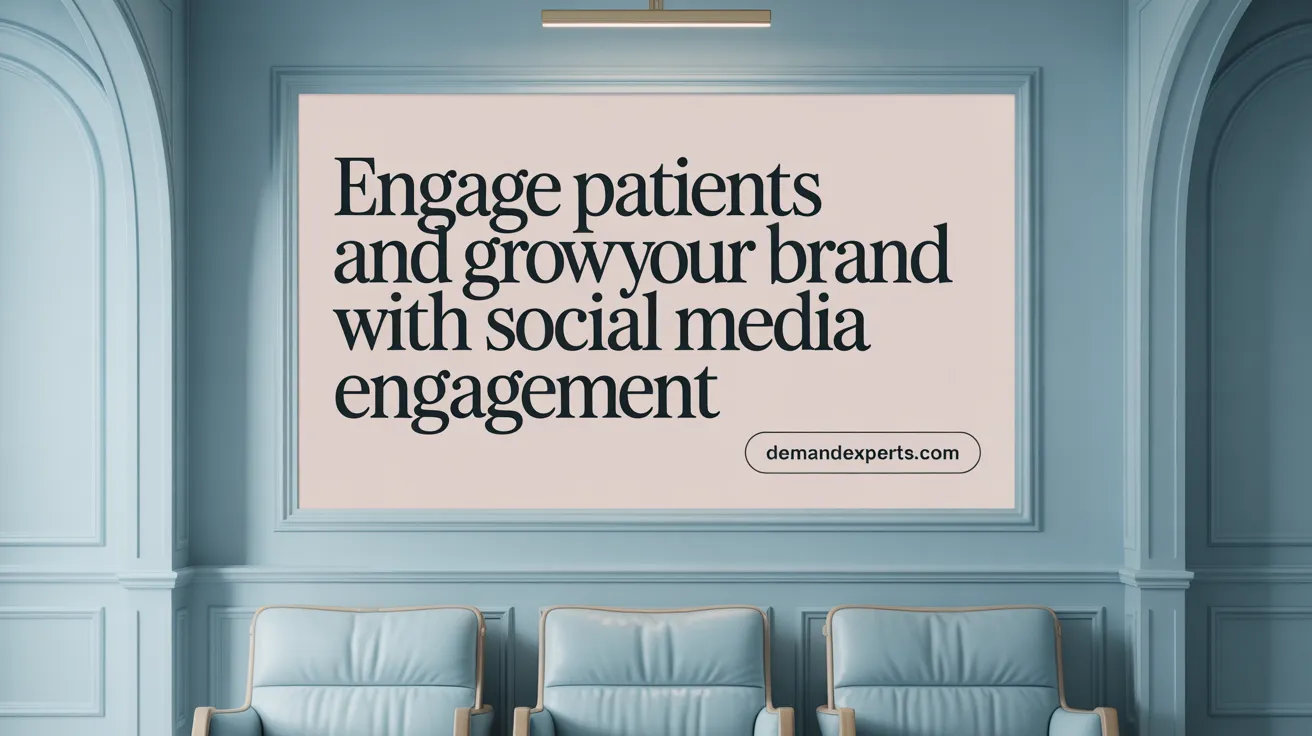
Platforms Like Facebook, Instagram, LinkedIn, Twitter
Healthcare marketers actively use Facebook, Instagram, LinkedIn, and Twitter to build brand awareness and foster trust. Each platform serves a unique role: Facebook and Instagram excel for community engagement and visual storytelling, LinkedIn targets professional audiences, and Twitter facilitates timely health updates.
Community Engagement
Creating interactive and consistent content invites patient participation and strengthens relationships. Regular posting of health tips, educational materials, and patient testimonials encourages community dialogue and loyalty. See more about Social media marketing for healthcare providers.
Targeted Advertising
Social media advertising allows healthcare providers to reach specific demographics such as age, location, and interests. This precise targeting increases campaign efficiency and attracts high-value patients. Learn about Targeted Healthcare Advertising.
Influencer Partnerships
Collaborating with healthcare influencers or trusted medical professionals extends reach and enhances credibility. Influencers can share personal experiences or expert insights that resonate authentically with target audiences. Additional insight on Healthcare influencer marketing and Healthcare Influencer Partnerships is available.
Managing Social Presence Ethically and Compliantly
Upholding HIPAA compliance and professional standards is critical. Healthcare organizations must ensure patient privacy, avoid sharing sensitive data, and maintain transparency while engaging socially, preserving both trust and legal compliance. See Healthcare marketing compliance challenges and HIPAA Compliance in Healthcare Marketing.
Paid Advertising for Healthcare: Leveraging PPC for Immediate Impact
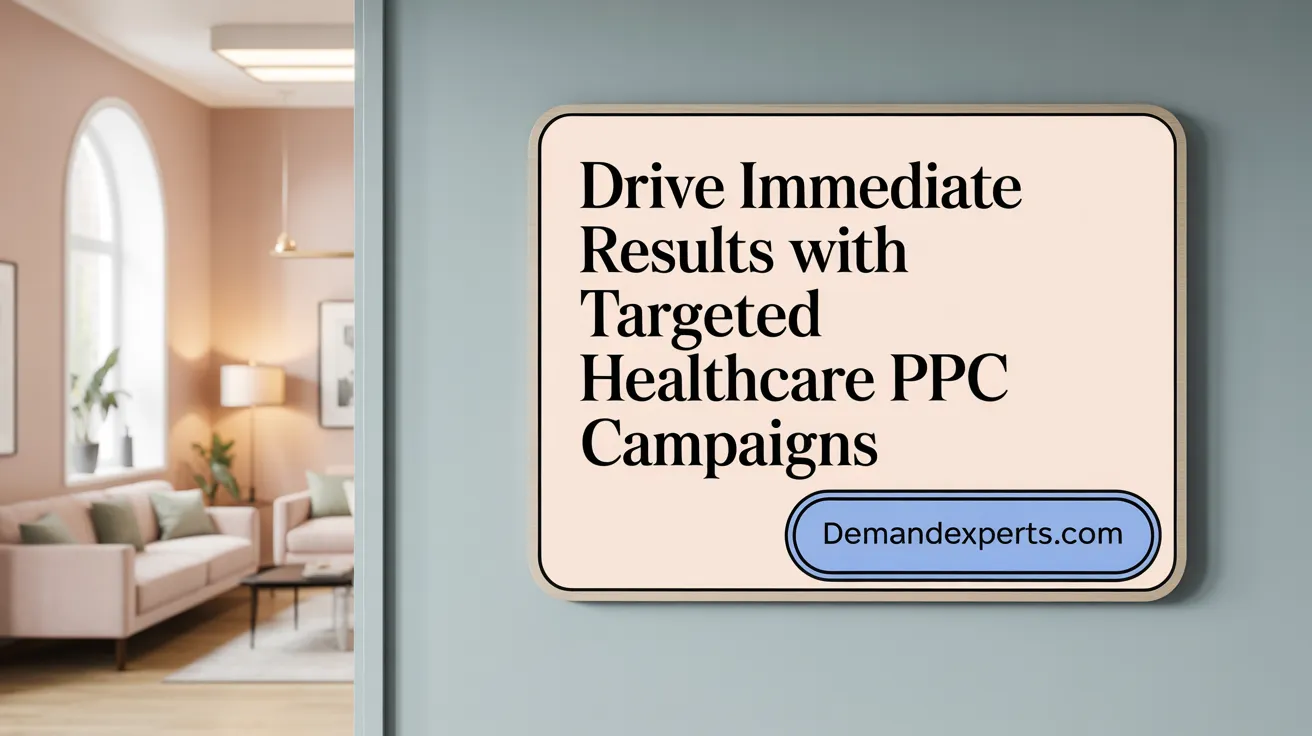
What are the benefits of pay-per-click advertising in healthcare?
Pay-per-click (PPC advertising in healthcare) offers healthcare providers immediate visibility and rapid traffic generation by placing paid ads on search engines and social media platforms. It is a cost-effective way to target prequalified leads, ensuring marketing budgets are efficiently spent on users actively searching for relevant healthcare services. PPC campaigns provide measurable results, enabling clear tracking of conversions and patient acquisition costs.
How can healthcare marketers create targeted PPC campaigns?
Healthcare PPC campaigns excel when focused on specific keywords related to medical services, procedures, or health topics. Demographic targeting based on location, age, gender, or health needs allows healthcare providers to reach the patients most likely to engage. This precise targeting improves ad relevance and conversion rates by connecting with individuals actively seeking care. Effective healthcare PPC strategies are outlined in resources on Healthcare digital marketing strategies.
What role does keyword and demographic targeting play?
Keyword selection ensures ads appear for relevant patient searches while demographic filters refine the audience to maximize impact. Incorporating local SEO strategies, such as targeting geographic keywords, enhances local patient acquisition. Continual refinement of keywords and demographic parameters helps maintain campaign effectiveness in a competitive healthcare market, as discussed in Local SEO for healthcare.
How does data integration enhance PPC ROI?
Integrating data from conversation intelligence tools and analytics platforms like Invoca allows healthcare marketers to optimize bidding strategies based on real patient interactions. This improves return on investment by identifying keywords and ads that drive phone calls, appointment bookings, and conversions. Data-driven adjustments also support compliance by monitoring ad content and patient data handling.
What compliance considerations are critical in healthcare PPC advertising?
Compliance with HIPAA, and other privacy regulations is paramount. Marketers must ensure that patient data collected from ads is handled securely and that ad content adheres to healthcare marketing guidelines. Working with specialized agencies familiar with healthcare regulations supports legal safety and builds patient trust, as emphasized in Healthcare marketing compliance challenges.
Overall, PPC advertising, when leveraged strategically with targeted keywords, data insights, and compliance vigilance, delivers immediate patient engagement and strengthens healthcare providers' digital presence.
Email and SMS Marketing: Personalized Patient Communication and Retention
Benefits and Strategies of Email Marketing in Healthcare
Email marketing remains a cost-effective, scalable tool for healthcare providers to engage patients. Personalized emails delivering health tips, service updates, and appointment reminders can enhance patient loyalty and improve retention. Focusing on educational content in emails helps build trust and authority.
Segmenting and Automating Campaigns
Utilizing healthcare CRM platforms enables precise segmentation based on patient demographics and health history. Automated campaigns triggered by patient interactions or timelines ensure timely, relevant messaging, increasing engagement and response rates. Learn more about AI-powered personalization in healthcare marketing.
Leveraging SMS for Direct Communication
SMS marketing complements email by offering instant, direct contact with patients. It's particularly effective for appointment reminders, vaccination alerts, and urgent updates, improving adherence and reducing no-shows.
Ensuring Compliance with Privacy Laws
Adhering to regulations such as HIPAA is critical when handling patient information in digital communications. Healthcare marketers must implement secure messaging platforms and maintain transparency to protect privacy and build patient trust.
Nurturing Patient Relationships Through Consistent Communication
Combining personalized emails and SMS messaging fosters ongoing patient relationships. Regular, relevant communication encourages proactive health management and enhances overall patient satisfaction. For strategies on Healthcare digital marketing 2024, visit the comprehensive guide.
Emerging Technologies and Trends: AI, Machine Learning, and Voice Search Optimization
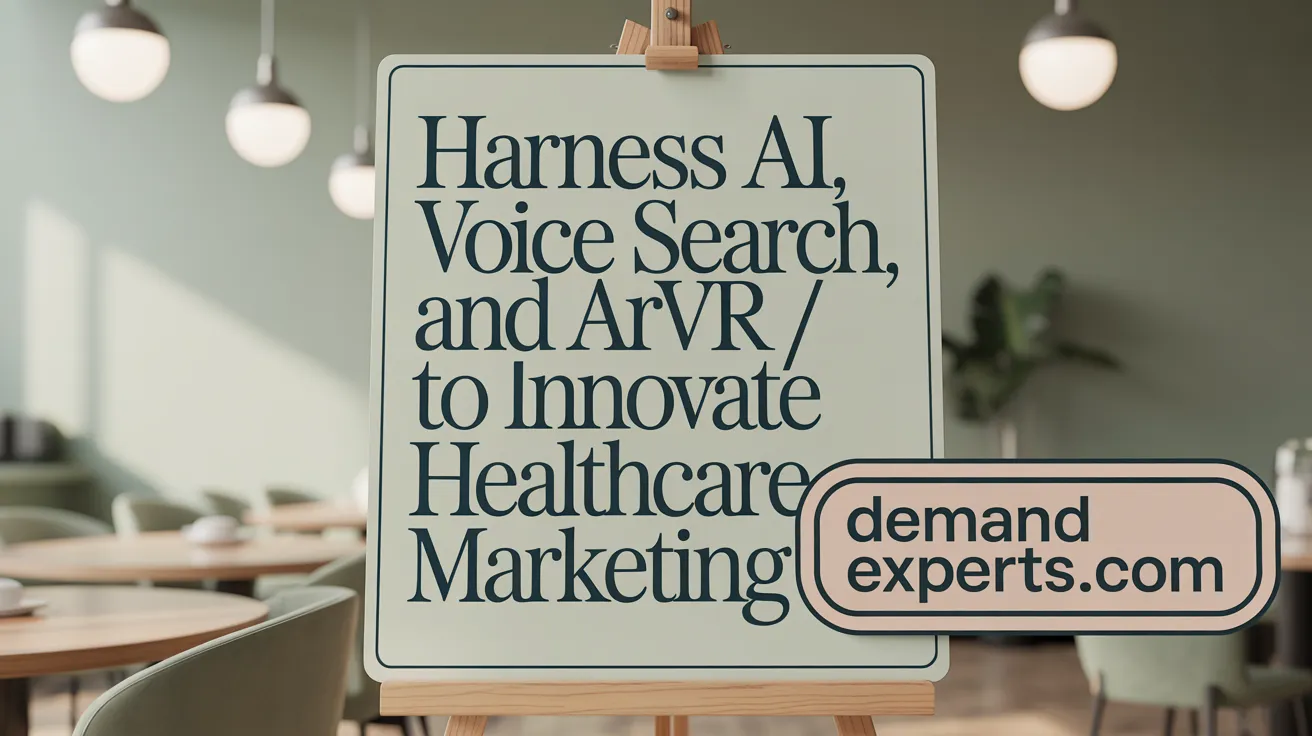
AI-powered personalization and automation
Artificial Intelligence (AI) is revolutionizing healthcare digital marketing by enabling hyper-personalized patient engagement. Utilizing patient data, AI crafts tailored messages and automates routine marketing tasks, enhancing efficiency and relevance. This personalization increases patient trust and loyalty, as patients receive content that resonates with their unique health needs and preferences. Explore AI-powered personalization in healthcare marketing and Data-Driven Personalization in Healthcare for more insights.
Machine learning for data analysis and targeting
Machine learning algorithms analyze large datasets to predict patient behaviors and preferences, allowing marketers to fine-tune targeting strategies. These insights help optimize ad spend and content delivery by identifying high-value patient segments and anticipating their healthcare needs, thus improving conversion rates and marketing ROI. Check out AI and Machine Learning in Healthcare Marketing and AI in Healthcare Marketing for strategies and case studies.
Voice search optimization techniques
The widespread adoption of voice-activated devices demands natural language keyword strategies and structured data implementation. Optimizing content for voice search helps healthcare providers appear prominently in voice search results, capturing a growing demographic that prefers conversational queries over typed searches. Learn more about Voice Search Optimization in Healthcare to enhance your visibility.
Integration of chatbots and AR/VR
AI-powered chatbots facilitate instant patient interaction, improving user experience by providing timely responses, appointment scheduling support, and preliminary health guidance. Augmented reality (AR) and virtual reality (VR) technologies are emerging tools used to create immersive educational experiences, helping patients understand complex medical information and differentiate healthcare brands. For comprehensive approaches, see AR and VR applications in healthcare marketing and Healthcare chatbots benefits.
Telehealth promotion via digital marketing
Telehealth services are increasingly promoted through targeted digital campaigns that highlight convenience and accessibility. Emphasizing telehealth within marketing messages attracts patients seeking flexible care options and enhances healthcare providers’ market reach by showcasing integrated digital service capabilities. Refer to Telehealth integration marketing and COVID-19 telehealth increase for effective telehealth digital marketing strategies.
Website Optimization and Patient Experience Enhancement
Responsive and Mobile-Friendly Websites
A responsive design that adapts seamlessly to mobile devices is essential, as over half of healthcare-related web searches occur on smartphones. Mobile optimization ensures accessibility and a positive experience for the majority of patients searching for providers online. For further insights, see Responsive healthcare websites and mobile optimization.
Online Appointment Booking
Integrating online scheduling platforms directly into healthcare websites increases convenience for patients and improves conversion rates. It streamlines the booking process, reducing friction and encouraging appointment commitments. Additionally, explore Online scheduling and patient portals in healthcare marketing.
Secure Patient Portals
Secure portals offer patients safe access to personal health information, test results, and communication with providers. Incorporating these within the website enhances patient engagement and trust while ensuring compliance with HIPAA privacy regulations. Learn more about HIPAA compliance in healthcare marketing.
Fast Loading Times and Easy Navigation
Websites must load quickly and feature intuitive navigation to minimize patient frustration. Clear menus, organized content, and straightforward pathways help users find relevant information and services swiftly. For best practices, see Healthcare website optimization and Healthcare responsive design.
Showcasing Credentials and Accreditations
Displaying awards, certifications, and affiliations prominently on the website reassures patients of the practice’s professionalism and quality standards. This transparency fosters confidence and validates the healthcare provider’s authority. See Digital marketing strategies for healthcare for examples and Building trust through healthcare accreditations.
Enhancing Trust Through Transparency
Providing comprehensive staff bios, patient testimonials, and clear communication about privacy practices serve to build trust. Transparency about treatment options and healthcare processes further supports patient confidence and loyalty. Learn more about Building trust through online marketing and Patient testimonials in healthcare marketing.
Implementing these website optimization strategies not only elevates patient experience but also drives greater engagement, improved appointment rates, and sustained trust in healthcare providers.
Compliance and Ethical Considerations in Healthcare Digital Marketing
What Are HIPAA Regulations and Their Role in Healthcare Marketing?
HIPAA (Health Insurance Portability and Accountability Act) regulations are central to healthcare digital marketing compliance. These rules safeguard patient information privacy and mandate secure handling of any protected health data used in marketing activities. Healthcare marketers must ensure all digital content and platforms comply with HIPAA to avoid legal risks and maintain patient trust.
How to Protect Data Privacy and Ensure Security?
Data privacy and protection require rigorous control over patient data collection, storage, and usage. Marketers should implement encryption, secure portals, and access controls. Any communication channels, including email campaigns and patient portals, must adhere to privacy protocols to prevent data breaches.
Why Is Marketing Vendor Compliance Important?
Third-party vendors providing platforms or services for digital marketing must follow HIPAA regulations and healthcare-specific privacy laws. Healthcare organizations should vet vendors for compliance guarantees and conduct regular audits. This oversight aligns vendor practices with legal requirements to protect patient data, addressing critical healthcare marketing compliance challenges.
What Constitutes Transparent and Ethical Marketing Practices?
Transparent marketing involves clear communication about data use, honest service descriptions, and avoidance of misleading claims. Ethical marketing respects patient dignity, refrains from exploiting vulnerabilities, and promotes truthful, educational content. This approach strengthens patient-provider relationships.
How Does Ethical Compliance Build Long-Term Patient Trust?
Adherence to privacy laws and ethical standards fosters confidence among patients. Trust emerges from consistent protection of sensitive information and respectful engagement. Long-term patient loyalty and positive reputation stem from transparent practices and legal compliance, enhancing overall patient retention and acquisition with proven healthcare patient retention email marketing.
In summary, integrating HIPAA compliance, robust data privacy measures, vendor oversight, and ethical marketing fosters an environment of trust crucial for the success of healthcare digital marketing strategies.
Data Analytics and Measurement: Driving Strategy Through Insights
What analytics tools are effective for healthcare marketing?
Healthcare marketing relies on robust analytics tools like Google Analytics and specialized platforms such as Invoca, which provide conversion intelligence tailored for healthcare settings. These tools enable providers to track patient interactions across multiple channels, including website visits, social media, and call data, offering comprehensive insights into campaign performance. For more on Healthcare marketing analytics and Healthcare analytics, explore these resources.
How is ROI and patient engagement measured?
Measuring ROI in healthcare marketing includes tracking key metrics such as website traffic, appointment bookings, social media engagement, and conversion rates from PPC campaigns. Incorporating conversation intelligence software enhances insight into patient interaction quality, while ongoing analysis through marketing mix modeling and A/B testing supports continual optimization. Patient engagement is gauged via click-through rates, email open rates, and social platform interactions, as detailed in discussions on effective email marketing in healthcare and social media marketing for healthcare.
What role do conversation intelligence platforms play?
Conversation intelligence platforms analyze both online and offline patient communications, allowing healthcare marketers to refine targeting strategies and improve personalization. By converting unstructured interactions into actionable data, these platforms help identify patient preferences and pain points, enabling automated task management and more relevant outreach while maintaining HIPAA-compliant privacy standards. For a broader view of AI and machine learning in healthcare marketing and AI conversation intelligence in healthcare, see these resources.
How is data used for personalization in healthcare marketing?
Leveraging aggregated patient demographics and behavioral data, healthcare marketers create tailored campaigns across email, website content, and social media that resonate with individual patient needs. Personalized healthcare marketing boosts engagement and loyalty by delivering relevant health advice, reminders, and service promotions, increasing conversion and retention rates. Learn more about personalized patient communication and personalized campaigns with AI.
How do healthcare marketers ensure ethical data handling and privacy adherence?
Compliance with HIPAA, FDA, GDPR, and other privacy regulations is foundational in healthcare marketing analytics. Healthcare organizations utilize secure data storage, anonymized tracking, and transparent patient data policies. Collaborating with compliant technology vendors and regularly auditing data practices uphold ethical standards, fostering trust and legal security. Additional insights on healthcare marketing compliance challenges and legal considerations for healthcare data can be found in these resources.
Omnichannel Marketing: Creating Cohesive Patient Journeys
Integrating Multiple Digital Channels
Omnichannel marketing in healthcare strategically combines various digital touchpoints to create seamless patient experiences. This integration encompasses channels such as SEO-optimized websites, PPC advertising, social media platforms, email campaigns, and SMS messaging. The goal is to meet patients wherever they are online, ensuring fluid transitions between channels that reinforce brand consistency and maximize engagement.
Consistent Messaging Across Platforms
Consistent messaging is paramount in omnichannel marketing, fostering trust and recognition across all patient interactions. Healthcare providers maintain cohesive content themes, branding, and patient-centric communication to enhance credibility. This unified approach allows patients to receive the same core health information and service messaging whether engaging on social media, through email newsletters, or via paid advertisements.
Combining SEO, PPC, Social Media, and Email
A robust omnichannel strategy strategically combines SEO to capture organic traffic, PPC to target immediate conversions, social media to build community engagement, and email marketing to nurture ongoing relationships. These channels complement each other, with SEO and PPC driving website visits, social media amplifying content reach, and email campaigns delivering personalized content and appointment reminders to foster loyalty. For enhanced personalization, explore the benefits of AI-powered personalization in healthcare marketing.
Leveraging Marketing Automation Tools
Marketing automation platforms enable healthcare marketers to coordinate complex omnichannel efforts efficiently. By automating personalized messaging, scheduling multi-channel campaigns, and analyzing performance metrics, these tools optimize patient engagement while maintaining compliance with HIPAA and privacy regulations. Automation supports timely communication such as reminder emails, follow-up surveys, and targeted health information based on patient data.
Examples of Successful Omnichannel Strategies
Leading healthcare organizations, like Mayo Clinic and Cleveland Clinic, exemplify effective omnichannel marketing by integrating educational content, patient testimonials, and interactive features across websites, social media, and email communications. Platforms such as EngageLab offer scalable solutions to manage omnichannel campaigns—including SMS, push notifications, and WhatsApp messaging—enabling healthcare providers to seamlessly engage patients and improve outcomes. Additionally, incorporating AR and VR applications in healthcare marketing can further elevate patient engagement through immersive digital experiences.
The Future of Healthcare Digital Marketing: Embracing Innovation and Patient-Centricity
Agility and Innovation Are Essential
The healthcare marketing landscape is rapidly evolving, requiring providers to remain agile and embrace innovation. Digital channels and tools must be adapted promptly to meet shifting patient expectations and regulatory demands. Continuous experimentation and adoption of emerging strategies allow healthcare organizations to stand out in an increasingly competitive environment.
Prioritizing Patient Experiences and Personalization
Delivering personalized, patient-centric marketing enhances engagement and builds trust. Leveraging detailed patient data enables tailored messages across multiple touchpoints—email, social media, websites—that resonate with individual needs and preferences. This focus on personalization fosters loyalty and improves healthcare outcomes.
Responsible Use of Emerging Technologies
Advanced technologies such as artificial intelligence, machine learning, and voice search optimization are transforming healthcare marketing. These tools help analyze patient behavior, automate routine processes, and optimize campaign targeting. However, compliance with HIPAA and ethical considerations must guide their implementation to protect patient privacy and maintain credibility.
Data-Driven Continuous Optimization
Healthcare digital marketing thrives on robust analytics. Utilizing data insights allows marketers to measure campaign effectiveness, refine strategies in real time, and maximize ROI. Platforms that offer conversation intelligence, patient engagement metrics, and multi-channel attribution empower organizations to make informed, evidence-based decisions for sustained growth.
Together, these elements shape a future-ready approach that prioritizes innovation and patient experience while navigating regulatory complexity and market dynamics effectively.
The Rise of Healthcare Digital Marketing
Importance of Digital Marketing in Healthcare
Digital marketing has become indispensable for healthcare providers aiming to enhance their visibility, attract new patients, and maintain competitive advantage. With an increasing number of patients turning to online sources to research medical conditions and healthcare providers, a strong and well-executed digital presence is essential. Effective strategies, including SEO, content marketing, social media, and email campaigns, enable healthcare organizations to educate patients, build trust, and streamline the care pathway.
Patient Online Research Behaviors
Studies show that approximately 77% of patients conduct online research before booking appointments, and about 80% of internet users search for health-related topics. This behavior underscores the critical role of accessible, accurate, and trustworthy digital content in influencing patient decisions. Moreover, search engines drive significantly more traffic to hospital websites than other sources, and consumers increasingly rely on reviews and social media engagement when choosing providers.
Impact of Digital Transformation on Healthcare Marketing
The COVID-19 pandemic accelerated the digital transformation in healthcare marketing, with telehealth and virtual engagement becoming central to patient experience. Organizations have adopted advanced tools such as AI-driven analytics, personalized marketing platforms, and omnichannel strategies to meet patient expectations for convenience and tailored communications. Compliance with privacy regulations (like HIPAA) alongside innovative digital solutions allows healthcare marketers to optimize outreach efforts while maintaining trust and legal integrity.
Search Engine Optimization: The Cornerstone of Online Visibility

Effective SEO strategies for healthcare
SEO is foundational for healthcare providers aiming to improve online visibility and attract high-value patients. Successful strategies involve optimizing the website's technical aspects, ensuring content quality, and adhering to search engine algorithms. This multifaceted approach drives organic traffic, enhances patient acquisition, and builds trust.
Website optimization essentials
A healthcare website should provide a fast-loading, secure, and user-friendly experience. Clear navigation, structured data implementation, and optimized metadata (titles and descriptions) improve search rankings. Mobile optimization is critical as over half of health-related searches occur on mobile devices, ensuring accessibility and responsiveness across all platforms.
Strategic keyword usage
Keyword research must focus on terms relevant to patient needs, including specific services, symptoms, and local queries. Incorporating natural language keywords, especially for emerging voice search trends, improves discoverability. Keyword placement in titles, headings, and content should maintain readability and relevance.
Local SEO's role
Healthcare providers benefit significantly from local SEO tactics such as managing Google Business Profiles, accurate contact information, patient reviews, and localized content. Using geo-specific keywords in website content and metadata drives higher visibility in location-based searches, connecting providers to nearby patients.
Compliance with Google's E-A-T guidelines
Adhering to Expertise, Authoritativeness, and Trustworthiness (E-A-T) principles is essential in healthcare SEO. Publishing doctor-reviewed, evidence-based, and accurate content reinforces credibility. Displaying certifications, accreditations, and patient testimonials further strengthens trust and ranking potential.
Continuous mobile optimization
Given the predominant use of smartphones for health searches, maintaining a responsive design and mobile-friendly interface is non-negotiable. Mobile optimization increases engagement, lowers bounce rates, and ensures compliance with search engine requirements for ranking.
By integrating these SEO best practices, healthcare providers can enhance their digital footprint, build patient trust, and achieve measurable growth in patient acquisition.
Content Marketing: Building Trust and Authority through Valuable Information

Importance of High-Quality Content
High-quality content is foundational in healthcare digital marketing, playing a critical role in establishing trust and authority. Educational and informative materials not only engage patients but also demonstrate a healthcare provider's expertise and commitment to patient well-being.
Blogs and Articles
Blogs and articles remain effective tools for delivering valuable health information. Regularly updated, well-researched posts help attract organic traffic and improve search engine rankings. They serve as platforms to address patient concerns, explain medical conditions, and highlight available services, reinforcing the provider’s role as a trusted health resource.
Patient Education
Educating patients through content empowers them to make informed healthcare decisions. Clear explanations of procedures, treatment options, and preventive care increase patient confidence and adherence. Educational campaigns integrated into content marketing in healthcare nurture patient relationships and encourage ongoing engagement.
Multimedia Content Including Videos
Incorporating multimedia such as videos significantly enhances engagement. Educational videos, virtual tours, and doctor interviews make complex medical information more accessible and relatable. Videos can increase conversion rates by up to 80%, providing a powerful way to communicate trust and credibility.
Patient Testimonials and Social Proof
Patient testimonials add an authentic voice to content marketing, strengthening credibility and influencing prospective patients’ decisions. Displaying real experiences and reviews builds social proof, which is highly persuasive in motivating new patient inquiries and appointments, as noted in healthcare social media marketing strategies.
Social Media Marketing: Engaging Communities and Enhancing Brand Awareness

Platforms Like Facebook, Instagram, LinkedIn, Twitter
Healthcare marketers actively use Facebook, Instagram, LinkedIn, and Twitter to build brand awareness and foster trust. Each platform serves a unique role: Facebook and Instagram excel for community engagement and visual storytelling, LinkedIn targets professional audiences, and Twitter facilitates timely health updates.
Community Engagement
Creating interactive and consistent content invites patient participation and strengthens relationships. Regular posting of health tips, educational materials, and patient testimonials encourages community dialogue and loyalty. See more about Social media marketing for healthcare providers.
Targeted Advertising
Social media advertising allows healthcare providers to reach specific demographics such as age, location, and interests. This precise targeting increases campaign efficiency and attracts high-value patients. Learn about Targeted Healthcare Advertising.
Influencer Partnerships
Collaborating with healthcare influencers or trusted medical professionals extends reach and enhances credibility. Influencers can share personal experiences or expert insights that resonate authentically with target audiences. Additional insight on Healthcare influencer marketing and Healthcare Influencer Partnerships is available.
Managing Social Presence Ethically and Compliantly
Upholding HIPAA compliance and professional standards is critical. Healthcare organizations must ensure patient privacy, avoid sharing sensitive data, and maintain transparency while engaging socially, preserving both trust and legal compliance. See Healthcare marketing compliance challenges and HIPAA Compliance in Healthcare Marketing.
Paid Advertising for Healthcare: Leveraging PPC for Immediate Impact

What are the benefits of pay-per-click advertising in healthcare?
Pay-per-click (PPC advertising in healthcare) offers healthcare providers immediate visibility and rapid traffic generation by placing paid ads on search engines and social media platforms. It is a cost-effective way to target prequalified leads, ensuring marketing budgets are efficiently spent on users actively searching for relevant healthcare services. PPC campaigns provide measurable results, enabling clear tracking of conversions and patient acquisition costs.
How can healthcare marketers create targeted PPC campaigns?
Healthcare PPC campaigns excel when focused on specific keywords related to medical services, procedures, or health topics. Demographic targeting based on location, age, gender, or health needs allows healthcare providers to reach the patients most likely to engage. This precise targeting improves ad relevance and conversion rates by connecting with individuals actively seeking care. Effective healthcare PPC strategies are outlined in resources on Healthcare digital marketing strategies.
What role does keyword and demographic targeting play?
Keyword selection ensures ads appear for relevant patient searches while demographic filters refine the audience to maximize impact. Incorporating local SEO strategies, such as targeting geographic keywords, enhances local patient acquisition. Continual refinement of keywords and demographic parameters helps maintain campaign effectiveness in a competitive healthcare market, as discussed in Local SEO for healthcare.
How does data integration enhance PPC ROI?
Integrating data from conversation intelligence tools and analytics platforms like Invoca allows healthcare marketers to optimize bidding strategies based on real patient interactions. This improves return on investment by identifying keywords and ads that drive phone calls, appointment bookings, and conversions. Data-driven adjustments also support compliance by monitoring ad content and patient data handling.
What compliance considerations are critical in healthcare PPC advertising?
Compliance with HIPAA, and other privacy regulations is paramount. Marketers must ensure that patient data collected from ads is handled securely and that ad content adheres to healthcare marketing guidelines. Working with specialized agencies familiar with healthcare regulations supports legal safety and builds patient trust, as emphasized in Healthcare marketing compliance challenges.
Overall, PPC advertising, when leveraged strategically with targeted keywords, data insights, and compliance vigilance, delivers immediate patient engagement and strengthens healthcare providers' digital presence.
Email and SMS Marketing: Personalized Patient Communication and Retention
Benefits and Strategies of Email Marketing in Healthcare
Email marketing remains a cost-effective, scalable tool for healthcare providers to engage patients. Personalized emails delivering health tips, service updates, and appointment reminders can enhance patient loyalty and improve retention. Focusing on educational content in emails helps build trust and authority.
Segmenting and Automating Campaigns
Utilizing healthcare CRM platforms enables precise segmentation based on patient demographics and health history. Automated campaigns triggered by patient interactions or timelines ensure timely, relevant messaging, increasing engagement and response rates. Learn more about AI-powered personalization in healthcare marketing.
Leveraging SMS for Direct Communication
SMS marketing complements email by offering instant, direct contact with patients. It's particularly effective for appointment reminders, vaccination alerts, and urgent updates, improving adherence and reducing no-shows.
Ensuring Compliance with Privacy Laws
Adhering to regulations such as HIPAA is critical when handling patient information in digital communications. Healthcare marketers must implement secure messaging platforms and maintain transparency to protect privacy and build patient trust.
Nurturing Patient Relationships Through Consistent Communication
Combining personalized emails and SMS messaging fosters ongoing patient relationships. Regular, relevant communication encourages proactive health management and enhances overall patient satisfaction. For strategies on Healthcare digital marketing 2024, visit the comprehensive guide.
Emerging Technologies and Trends: AI, Machine Learning, and Voice Search Optimization

AI-powered personalization and automation
Artificial Intelligence (AI) is revolutionizing healthcare digital marketing by enabling hyper-personalized patient engagement. Utilizing patient data, AI crafts tailored messages and automates routine marketing tasks, enhancing efficiency and relevance. This personalization increases patient trust and loyalty, as patients receive content that resonates with their unique health needs and preferences. Explore AI-powered personalization in healthcare marketing and Data-Driven Personalization in Healthcare for more insights.
Machine learning for data analysis and targeting
Machine learning algorithms analyze large datasets to predict patient behaviors and preferences, allowing marketers to fine-tune targeting strategies. These insights help optimize ad spend and content delivery by identifying high-value patient segments and anticipating their healthcare needs, thus improving conversion rates and marketing ROI. Check out AI and Machine Learning in Healthcare Marketing and AI in Healthcare Marketing for strategies and case studies.
Voice search optimization techniques
The widespread adoption of voice-activated devices demands natural language keyword strategies and structured data implementation. Optimizing content for voice search helps healthcare providers appear prominently in voice search results, capturing a growing demographic that prefers conversational queries over typed searches. Learn more about Voice Search Optimization in Healthcare to enhance your visibility.
Integration of chatbots and AR/VR
AI-powered chatbots facilitate instant patient interaction, improving user experience by providing timely responses, appointment scheduling support, and preliminary health guidance. Augmented reality (AR) and virtual reality (VR) technologies are emerging tools used to create immersive educational experiences, helping patients understand complex medical information and differentiate healthcare brands. For comprehensive approaches, see AR and VR applications in healthcare marketing and Healthcare chatbots benefits.
Telehealth promotion via digital marketing
Telehealth services are increasingly promoted through targeted digital campaigns that highlight convenience and accessibility. Emphasizing telehealth within marketing messages attracts patients seeking flexible care options and enhances healthcare providers’ market reach by showcasing integrated digital service capabilities. Refer to Telehealth integration marketing and COVID-19 telehealth increase for effective telehealth digital marketing strategies.
Website Optimization and Patient Experience Enhancement
Responsive and Mobile-Friendly Websites
A responsive design that adapts seamlessly to mobile devices is essential, as over half of healthcare-related web searches occur on smartphones. Mobile optimization ensures accessibility and a positive experience for the majority of patients searching for providers online. For further insights, see Responsive healthcare websites and mobile optimization.
Online Appointment Booking
Integrating online scheduling platforms directly into healthcare websites increases convenience for patients and improves conversion rates. It streamlines the booking process, reducing friction and encouraging appointment commitments. Additionally, explore Online scheduling and patient portals in healthcare marketing.
Secure Patient Portals
Secure portals offer patients safe access to personal health information, test results, and communication with providers. Incorporating these within the website enhances patient engagement and trust while ensuring compliance with HIPAA privacy regulations. Learn more about HIPAA compliance in healthcare marketing.
Fast Loading Times and Easy Navigation
Websites must load quickly and feature intuitive navigation to minimize patient frustration. Clear menus, organized content, and straightforward pathways help users find relevant information and services swiftly. For best practices, see Healthcare website optimization and Healthcare responsive design.
Showcasing Credentials and Accreditations
Displaying awards, certifications, and affiliations prominently on the website reassures patients of the practice’s professionalism and quality standards. This transparency fosters confidence and validates the healthcare provider’s authority. See Digital marketing strategies for healthcare for examples and Building trust through healthcare accreditations.
Enhancing Trust Through Transparency
Providing comprehensive staff bios, patient testimonials, and clear communication about privacy practices serve to build trust. Transparency about treatment options and healthcare processes further supports patient confidence and loyalty. Learn more about Building trust through online marketing and Patient testimonials in healthcare marketing.
Implementing these website optimization strategies not only elevates patient experience but also drives greater engagement, improved appointment rates, and sustained trust in healthcare providers.
Compliance and Ethical Considerations in Healthcare Digital Marketing
What Are HIPAA Regulations and Their Role in Healthcare Marketing?
HIPAA (Health Insurance Portability and Accountability Act) regulations are central to healthcare digital marketing compliance. These rules safeguard patient information privacy and mandate secure handling of any protected health data used in marketing activities. Healthcare marketers must ensure all digital content and platforms comply with HIPAA to avoid legal risks and maintain patient trust.
How to Protect Data Privacy and Ensure Security?
Data privacy and protection require rigorous control over patient data collection, storage, and usage. Marketers should implement encryption, secure portals, and access controls. Any communication channels, including email campaigns and patient portals, must adhere to privacy protocols to prevent data breaches.
Why Is Marketing Vendor Compliance Important?
Third-party vendors providing platforms or services for digital marketing must follow HIPAA regulations and healthcare-specific privacy laws. Healthcare organizations should vet vendors for compliance guarantees and conduct regular audits. This oversight aligns vendor practices with legal requirements to protect patient data, addressing critical healthcare marketing compliance challenges.
What Constitutes Transparent and Ethical Marketing Practices?
Transparent marketing involves clear communication about data use, honest service descriptions, and avoidance of misleading claims. Ethical marketing respects patient dignity, refrains from exploiting vulnerabilities, and promotes truthful, educational content. This approach strengthens patient-provider relationships.
How Does Ethical Compliance Build Long-Term Patient Trust?
Adherence to privacy laws and ethical standards fosters confidence among patients. Trust emerges from consistent protection of sensitive information and respectful engagement. Long-term patient loyalty and positive reputation stem from transparent practices and legal compliance, enhancing overall patient retention and acquisition with proven healthcare patient retention email marketing.
In summary, integrating HIPAA compliance, robust data privacy measures, vendor oversight, and ethical marketing fosters an environment of trust crucial for the success of healthcare digital marketing strategies.
Data Analytics and Measurement: Driving Strategy Through Insights
What analytics tools are effective for healthcare marketing?
Healthcare marketing relies on robust analytics tools like Google Analytics and specialized platforms such as Invoca, which provide conversion intelligence tailored for healthcare settings. These tools enable providers to track patient interactions across multiple channels, including website visits, social media, and call data, offering comprehensive insights into campaign performance. For more on Healthcare marketing analytics and Healthcare analytics, explore these resources.
How is ROI and patient engagement measured?
Measuring ROI in healthcare marketing includes tracking key metrics such as website traffic, appointment bookings, social media engagement, and conversion rates from PPC campaigns. Incorporating conversation intelligence software enhances insight into patient interaction quality, while ongoing analysis through marketing mix modeling and A/B testing supports continual optimization. Patient engagement is gauged via click-through rates, email open rates, and social platform interactions, as detailed in discussions on effective email marketing in healthcare and social media marketing for healthcare.
What role do conversation intelligence platforms play?
Conversation intelligence platforms analyze both online and offline patient communications, allowing healthcare marketers to refine targeting strategies and improve personalization. By converting unstructured interactions into actionable data, these platforms help identify patient preferences and pain points, enabling automated task management and more relevant outreach while maintaining HIPAA-compliant privacy standards. For a broader view of AI and machine learning in healthcare marketing and AI conversation intelligence in healthcare, see these resources.
How is data used for personalization in healthcare marketing?
Leveraging aggregated patient demographics and behavioral data, healthcare marketers create tailored campaigns across email, website content, and social media that resonate with individual patient needs. Personalized healthcare marketing boosts engagement and loyalty by delivering relevant health advice, reminders, and service promotions, increasing conversion and retention rates. Learn more about personalized patient communication and personalized campaigns with AI.
How do healthcare marketers ensure ethical data handling and privacy adherence?
Compliance with HIPAA, FDA, GDPR, and other privacy regulations is foundational in healthcare marketing analytics. Healthcare organizations utilize secure data storage, anonymized tracking, and transparent patient data policies. Collaborating with compliant technology vendors and regularly auditing data practices uphold ethical standards, fostering trust and legal security. Additional insights on healthcare marketing compliance challenges and legal considerations for healthcare data can be found in these resources.
Omnichannel Marketing: Creating Cohesive Patient Journeys
Integrating Multiple Digital Channels
Omnichannel marketing in healthcare strategically combines various digital touchpoints to create seamless patient experiences. This integration encompasses channels such as SEO-optimized websites, PPC advertising, social media platforms, email campaigns, and SMS messaging. The goal is to meet patients wherever they are online, ensuring fluid transitions between channels that reinforce brand consistency and maximize engagement.
Consistent Messaging Across Platforms
Consistent messaging is paramount in omnichannel marketing, fostering trust and recognition across all patient interactions. Healthcare providers maintain cohesive content themes, branding, and patient-centric communication to enhance credibility. This unified approach allows patients to receive the same core health information and service messaging whether engaging on social media, through email newsletters, or via paid advertisements.
Combining SEO, PPC, Social Media, and Email
A robust omnichannel strategy strategically combines SEO to capture organic traffic, PPC to target immediate conversions, social media to build community engagement, and email marketing to nurture ongoing relationships. These channels complement each other, with SEO and PPC driving website visits, social media amplifying content reach, and email campaigns delivering personalized content and appointment reminders to foster loyalty. For enhanced personalization, explore the benefits of AI-powered personalization in healthcare marketing.
Leveraging Marketing Automation Tools
Marketing automation platforms enable healthcare marketers to coordinate complex omnichannel efforts efficiently. By automating personalized messaging, scheduling multi-channel campaigns, and analyzing performance metrics, these tools optimize patient engagement while maintaining compliance with HIPAA and privacy regulations. Automation supports timely communication such as reminder emails, follow-up surveys, and targeted health information based on patient data.
Examples of Successful Omnichannel Strategies
Leading healthcare organizations, like Mayo Clinic and Cleveland Clinic, exemplify effective omnichannel marketing by integrating educational content, patient testimonials, and interactive features across websites, social media, and email communications. Platforms such as EngageLab offer scalable solutions to manage omnichannel campaigns—including SMS, push notifications, and WhatsApp messaging—enabling healthcare providers to seamlessly engage patients and improve outcomes. Additionally, incorporating AR and VR applications in healthcare marketing can further elevate patient engagement through immersive digital experiences.
The Future of Healthcare Digital Marketing: Embracing Innovation and Patient-Centricity
Agility and Innovation Are Essential
The healthcare marketing landscape is rapidly evolving, requiring providers to remain agile and embrace innovation. Digital channels and tools must be adapted promptly to meet shifting patient expectations and regulatory demands. Continuous experimentation and adoption of emerging strategies allow healthcare organizations to stand out in an increasingly competitive environment.
Prioritizing Patient Experiences and Personalization
Delivering personalized, patient-centric marketing enhances engagement and builds trust. Leveraging detailed patient data enables tailored messages across multiple touchpoints—email, social media, websites—that resonate with individual needs and preferences. This focus on personalization fosters loyalty and improves healthcare outcomes.
Responsible Use of Emerging Technologies
Advanced technologies such as artificial intelligence, machine learning, and voice search optimization are transforming healthcare marketing. These tools help analyze patient behavior, automate routine processes, and optimize campaign targeting. However, compliance with HIPAA and ethical considerations must guide their implementation to protect patient privacy and maintain credibility.
Data-Driven Continuous Optimization
Healthcare digital marketing thrives on robust analytics. Utilizing data insights allows marketers to measure campaign effectiveness, refine strategies in real time, and maximize ROI. Platforms that offer conversation intelligence, patient engagement metrics, and multi-channel attribution empower organizations to make informed, evidence-based decisions for sustained growth.
Together, these elements shape a future-ready approach that prioritizes innovation and patient experience while navigating regulatory complexity and market dynamics effectively.


